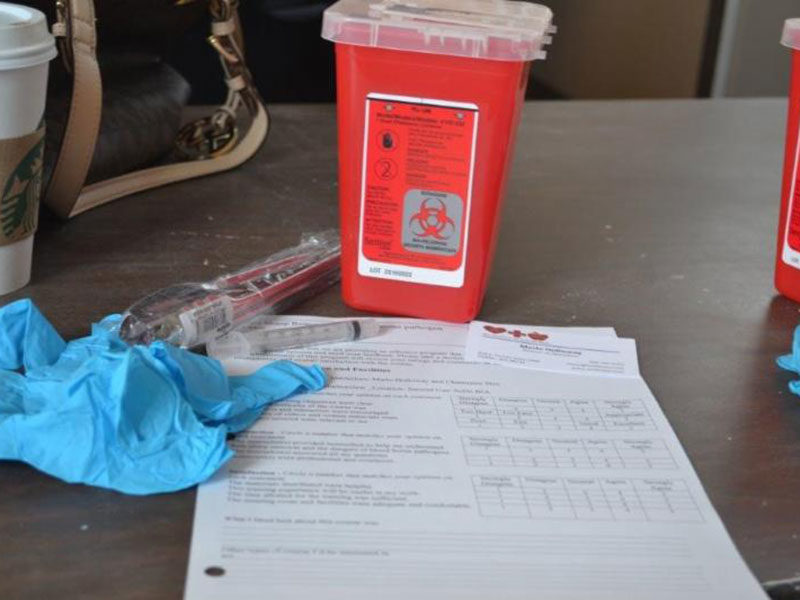Safe and legal sharps disposal in Seattle
By Marlo Holloway
Earlier this month, the SODO BIA sponsored a community education event in conjunction with An Ounce of Prevention on the topic of Safe and legal Sharps Disposal. The class was hosted in SODO at one of our local businesses, Second Use. This training is a response to the growing number of used hypodermic needles (sharps) found on private property.
Seattle is experiencing a growing number of discarded used sharps on both public and private property.
The Centers for Disease Control and Prevention says the nation is experiencing a crisis-level Heroin epidemic. Opioid overdoses, which includes Heroin, are responsible for more deaths daily than car accidents. Opioids are powerful pain relievers, and include methadone, heroin, fentanyl, hydrocodone, dilaudid, and Demerol. An estimated 2.5 million Americans have an opioid addiction. This epidemic can affect anyone regardless of age, race, gender or socioeconomic status. Studies have shown one of the largest contributing factors to a person becoming homeless is a substance abuse problem, therefore the rate of overdose and addiction is disproportionate in homeless communities.
Across King County and in SODO used hypodermic needles can be found at libraries, parks, parking lots, sidewalks, planters, store fronts, behind buildings, in storm water drains, and in street furniture. These needles create a blood borne pathogen health hazard to pets, children, sanitation workers and business employees.
Here is a brief event recap. Learn more by joining us at our next safe sharp removal course coming soon.
For needles found on public property
• Contact the SPU illegal dumping hotline, M-F, 8am-5pm at 206 684-7587
• They will come and remove needles and sharps within 24 hours
For needles found on private property
• Each business is responsible for safe sharp collection, storage and disposal
Sharps collection
• Use gloves and tongs
• Use an approved sharps container
• Do not use bare hands or fingers to pick up needles
• This increases the risk of a needle stick
• Sharps do not belong in a glass bottle, it can break
• Do not put sharps in aluminum cans or coffee cans
• Don’t place sharps directly into the garbage
Sharps storage
• Use an approved sharps container with a biohazard label
• If you do not have a sharps container you may use a puncture proof plastic bottle with a screw on cap. Place tape over the cap and write “sharps, do not recycle”
• Never place containers with used needles or syringes in a recycling bin.
• Never put loose sharps in the garbage.
Storage disposal
• Dispose of sharps containers when they’re half to three-quarters full
• Never place containers with used needles or syringes in a recycling bin
• 1751 Airport Way S. cross street Holgate. Located on side walk facing Office Depot (no loose needles)
During the class, we discussed how to safely collect, store and dispose of used sharps which includes hypodermic needles, lancets and syringes. We also talked about Blood Borne Pathogens and how to minimize your risk of exposure.
In closing, I would like to personally thank the SODO BIA for sponsoring our event and providing each participant with their own “starter kit” of a sharps container, tongs, gloves (and let’s not forget lunch)!
Additionally, thank you to these local businesses and their representatives that took the time to come be collaborative participants and learn together: Buffalo Industries, Alaskan Cooper, Prologis, Pacific Iron and Metal, Washington Chain Supply, Schlemlein Goetz Fick and Scruggs, and Seattle Goodwill.
Testimonials: What did you like best about the course?
“fun”
“friendly staff”
“Sharp disposal info”
“Interactive exercise”
“communication was relaxed but through”
“open discussion and acting out potential scenarios”
“The trainers were fun to listen to and great speakers”
“Interactive with participation and understandable language”
Watch us featured in the Seattle Public Utilities (SPU) sharps video.

